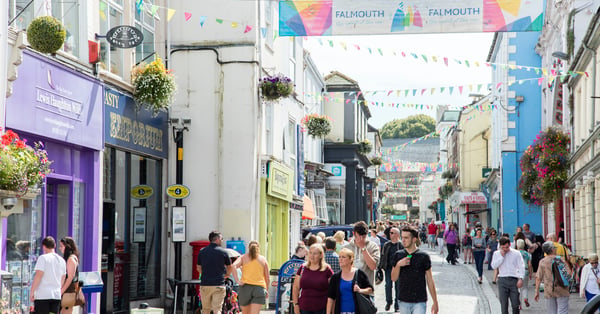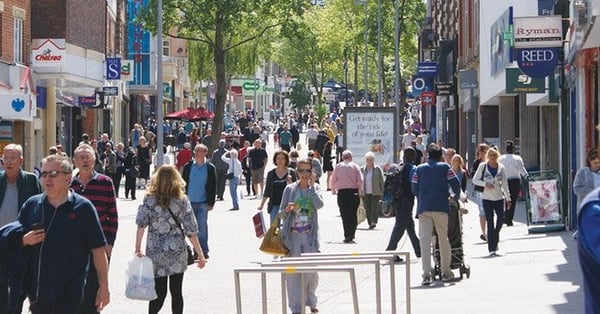
5 Top Benefits of Conference WiFi Solutions | WiFi SPARK
Whether it’s in the pub or on a train, the modern-day user expects free WiFi wherever they go. Events and conferences are no different. In fact, your attendees...
Read more
5 minute read | 01/04/2020

A Business Improvement District (BID) empowers local businesses to improve the area in which they trade and fund local projects and campaigns. They’ve become integral to towns and are essential for urban regeneration, employment initiatives and increased consumer spending in the area.
Although not everybody can secure their bids, here are the most successful business improvement districts that foster economic growth and a more consumer-centric experience.

The Falmouth BID is a not-for-profit company responsible for executing a number of innovative projects that aim to improve the trading environment of the Cornish town. From increasing visitor signage and putting more marketing into local festivities, to providing free car parking for businesses.
Working together with Falmouth Town Council, they wanted to find a solution that would support high usage during peak visitor periods and carry the high street in the off-season.
With cruise visitors sporadic, Falmouth wanted to solidify their position as a popular destination for visitors by investing in a public WiFi network.
After the implementation of a resilient and high-speed network, Falmouth is now established as a ‘digitally smart’ town and even won the UK's Best Digital High Street award. Reaping the benefits of increased dwell time from visitors, BIDs can now offer the data to local businesses, helping them to gain insight into their shoppers like never before.
This helps the optimisation of stores and remarketing strategies which has, in turn, helped local businesses to thrive.
It’s been so successful that the Falmouth Town Council is considering an expansion of the network. You can read more about this case study by clicking the link below.

Sutton Town Centre wanted to become a more attractive and vibrant retail, office and leisure destination after being voted as one of the top five places to live in London. Bringing together more than 500 local businesses and organisations, the BID worked as a key partner alongside the council’s masterplan.
It significantly strengthened Sutton’s offering and established it as ‘a better place to live, work and do business’. With their 2017 BID renewal promising annual events, better waste management and incentivised journeys to the town, they’ve continued to evaluate the effectiveness of their promotional spend annually.
Through footfall cameras and regular feedback from retailers, their district-centric approach has seen a combined footfall of over 18,000 as a result of ‘experiences’ otherwise unattainable by strict budgets. The implementation of free mixed recycling collections saw over 80,000kgs of waste collected in 2019.
Their reactivity has ensured they were a destination of choice, not habit.
You can learn more about Sutton’s success here.
Causeway Coast and Glens Borough Council are committed to improving the services the Northern Irish district offers. With many tourists visiting the famous Giant’s Causeway, featured on Games of Thrones, the council utilised a public WiFi system to collate and track this powerful visitor data.
With a network in place, local communities can now harvest valuable data to make better-informed decisions. That’s why Ballymoney, in Northern Ireland, introduced a WiFi system which has since had a spectacular impact on businesses there.
The data observed is continually used to analyse customer trends and determine what’s most effective on their local high street. With this detailed data, the Ballymoney community can ensure it makes improvements both businesses and visitors can benefit some. You can learn more about the successful implementation by clicking the case study below.
Northbank situated near Trafalgar Square wanted to pedestrianise one of its streets, with an overarching goal of increased audience engagement. They also wanted more insight into where shoppers came from and how they behaved on their journey.
If stores know dwell times and high traffic areas, they can make more informed business decisions that can drive revenue. With a staggering 17m footfall, they lacked the data to understand that figure. Are the majority walking through commuters? Do they shop? Are they residents or tourists? You can find out more about how Northbank secured their BID proposal and how they rejuvenated their local high street by clicking here.
If you want to share the successes of these thriving BIDs and are curious about the evolution of the high street over the years, our resource inspires towns to strive for that transformation.
Many high streets in the UK have already been revolutionised by successful BIDS, innovative technology and increased insights. It’s surprising what public, accessible WiFi can do to the high street. Increasing footfall, retaining customers and even establishing yourself as an innovator in retail.
That’s why we’ve created our ‘Transform Your Town’ guide which details how businesses and shoppers have all benefited from a reliable and intelligent WiFi network. From towns that are already taking advantage of a checklist for securing your BID, get access by downloading the guide below.
Rebecca is the Marketing Director. She's worked for SPARK TSL since 2012. She is responsible for high level marketing strategy focusing on lead generation and aiding the vision of the business; to ensure that no patient has to pay for entertainment.
More articles by the author

Whether it’s in the pub or on a train, the modern-day user expects free WiFi wherever they go. Events and conferences are no different. In fact, your attendees...
Read more

The 290 Business Improvement Districts (BIDs) in the UK are tasked with using combined levy income to implement projects that will benefit the local area. It’s...
Read more

The Business Improvement Districts (BIDs) in the UK have the responsibility of implementing projects that will benefit the local area. Using combined levy...
Read more